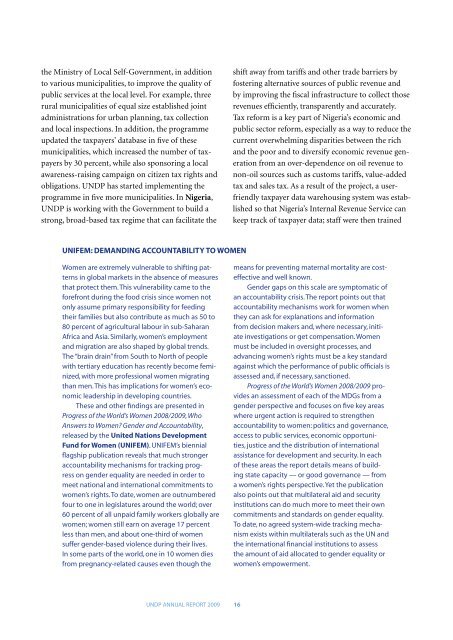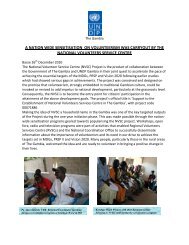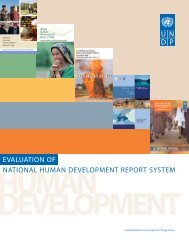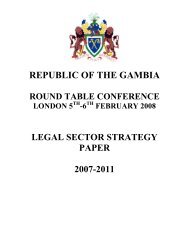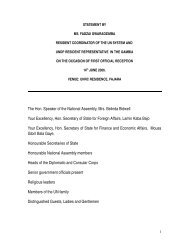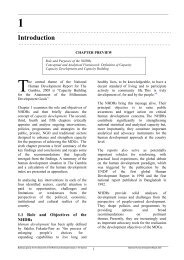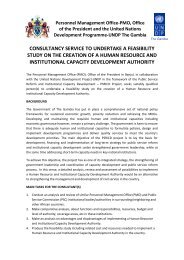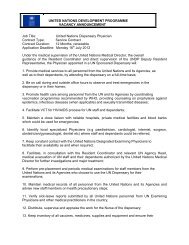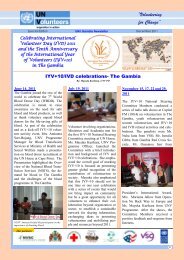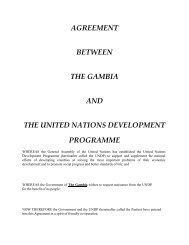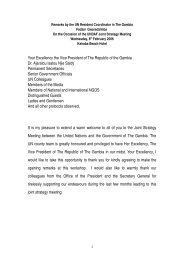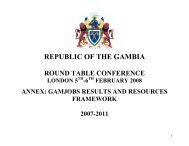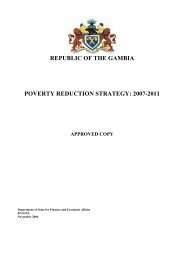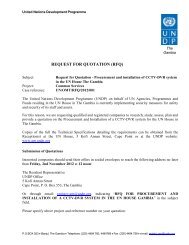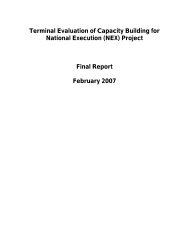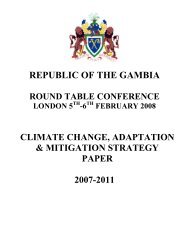Annual Report 2009 - United Nations Development Programme
Annual Report 2009 - United Nations Development Programme
Annual Report 2009 - United Nations Development Programme
Create successful ePaper yourself
Turn your PDF publications into a flip-book with our unique Google optimized e-Paper software.
the Ministry of Local Self-Government, in addition<br />
to various municipalities, to improve the quality of<br />
public services at the local level. For example, three<br />
rural municipalities of equal size established joint<br />
administrations for urban planning, tax collection<br />
and local inspections. In addition, the programme<br />
updated the taxpayers’ database in five of these<br />
municipalities, which increased the number of taxpayers<br />
by 30 percent, while also sponsoring a local<br />
awareness-raising campaign on citizen tax rights and<br />
obligations. UNDP has started implementing the<br />
programme in five more municipalities. In Nigeria,<br />
UNDP is working with the Government to build a<br />
strong, broad-based tax regime that can facilitate the<br />
shift away from tariffs and other trade barriers by<br />
fostering alternative sources of public revenue and<br />
by improving the fiscal infrastructure to collect those<br />
revenues efficiently, transparently and accurately.<br />
Tax reform is a key part of Nigeria’s economic and<br />
public sector reform, especially as a way to reduce the<br />
current overwhelming disparities between the rich<br />
and the poor and to diversify economic revenue generation<br />
from an over-dependence on oil revenue to<br />
non-oil sources such as customs tariffs, value-added<br />
tax and sales tax. As a result of the project, a userfriendly<br />
taxpayer data warehousing system was established<br />
so that Nigeria’s Internal Revenue Service can<br />
keep track of taxpayer data; staff were then trained<br />
UNIFEM: Demanding Accountability to Women<br />
Women are extremely vulnerable to shifting patterns<br />
in global markets in the absence of measures<br />
that protect them. This vulnerability came to the<br />
forefront during the food crisis since women not<br />
only assume primary responsibility for feeding<br />
their families but also contribute as much as 50 to<br />
80 percent of agricultural labour in sub-Saharan<br />
Africa and Asia. Similarly, women’s employment<br />
and migration are also shaped by global trends.<br />
The “brain drain” from South to North of people<br />
with tertiary education has recently become feminized,<br />
with more professional women migrating<br />
than men. This has implications for women’s economic<br />
leadership in developing countries.<br />
These and other findings are presented in<br />
Progress of the World’s Women 2008/<strong>2009</strong>, Who<br />
Answers to Women? Gender and Accountability,<br />
released by the <strong>United</strong> <strong>Nations</strong> <strong>Development</strong><br />
Fund for Women (UNIFEM). UNIFEM’s biennial<br />
flagship publication reveals that much stronger<br />
accountability mechanisms for tracking progress<br />
on gender equality are needed in order to<br />
meet national and international commitments to<br />
women’s rights. To date, women are outnumbered<br />
four to one in legislatures around the world; over<br />
60 percent of all unpaid family workers globally are<br />
women; women still earn on average 17 percent<br />
less than men, and about one-third of women<br />
suffer gender-based violence during their lives.<br />
In some parts of the world, one in 10 women dies<br />
from pregnancy-related causes even though the<br />
means for preventing maternal mortality are costeffective<br />
and well known.<br />
Gender gaps on this scale are symptomatic of<br />
an accountability crisis. The report points out that<br />
accountability mechanisms work for women when<br />
they can ask for explanations and information<br />
from decision makers and, where necessary, initiate<br />
investigations or get compensation. Women<br />
must be included in oversight processes, and<br />
advancing women’s rights must be a key standard<br />
against which the performance of public officials is<br />
assessed and, if necessary, sanctioned.<br />
Progress of the World’s Women 2008/<strong>2009</strong> provides<br />
an assessment of each of the MDGs from a<br />
gender perspective and focuses on five key areas<br />
where urgent action is required to strengthen<br />
accountability to women: politics and governance,<br />
access to public services, economic opportunities,<br />
justice and the distribution of international<br />
assistance for development and security. In each<br />
of these areas the report details means of building<br />
state capacity — or good governance — from<br />
a women’s rights perspective. Yet the publication<br />
also points out that multilateral aid and security<br />
institutions can do much more to meet their own<br />
commitments and standards on gender equality.<br />
To date, no agreed system-wide tracking mechanism<br />
exists within multilaterals such as the UN and<br />
the international financial institutions to assess<br />
the amount of aid allocated to gender equality or<br />
women’s empowerment.<br />
undp annual report <strong>2009</strong> 16


